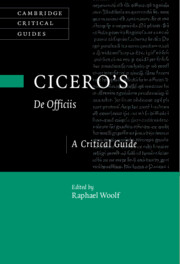Refine search
Actions for selected content:
4 results
3 - A Question of Jurisprudence
-
- Book:
- How Islam Rules in Iran
- Published online:
- 02 May 2024
- Print publication:
- 09 May 2024, pp 58-104
-
- Chapter
- Export citation

Cicero's ‘De Officiis'
- A Critical Guide
-
- Published online:
- 15 June 2023
- Print publication:
- 29 June 2023
13 - Property, Trade and Empire
- from Part II - Concepts
-
-
- Book:
- The Cambridge Companion to Hugo Grotius
- Published online:
- 03 September 2021
- Print publication:
- 16 September 2021, pp 275-290
-
- Chapter
- Export citation
4 - The Special Court’s Jurisdiction, Organization, and Trials
-
- Book:
- The Legal Legacy of the Special Court for Sierra Leone
- Published online:
- 29 July 2020
- Print publication:
- 16 July 2020, pp 65-106
-
- Chapter
- Export citation
